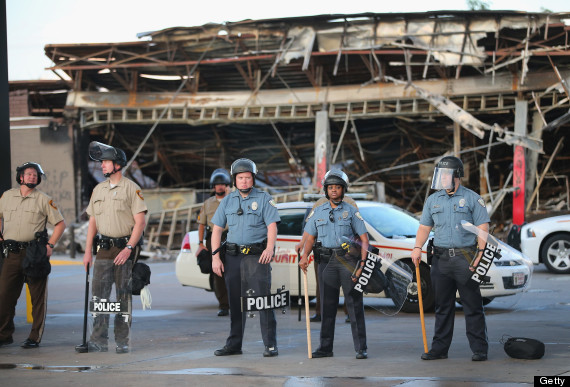Holder dispatches team that ‘inflamed’ Trayvon case
by JEROME R. CORSI
WND.com
NEW YORK – Responding to news that the Justice Department has dispatched its Community Relations Service to the scene of racially charged unrest in Ferguson, Missouri, the head of the Washington watchdog group Judicial Watch says it’s time for a civil rights investigation of Attorney General Eric Holder’s agency
Under Holder’s leadership, he said, the department “has a record of racially inflammatory rhetoric that is extreme in ideology and cynical in its politics.”
“The idea that this Justice Department could be trusted to mediate is highly suspect,” he said.
What is the biggest problem facing America today? Sound off in the WND Poll.
Fitton points out the Community Relations Service intervened in the Trayvon Martin case in Florida, helping organize protests that pressed for the prosecution of George Zimmerman, who later was acquitted by a jury of murder.
Holder said in a statement Monday that the fatal shooting Saturday night of an unarmed black teenager in Ferguson, a St. Louis suburb, which has led to rioting and looting, deserves a full review. The FBI, the Associated Press reported, is looking into possible civil rights violations.
The St. Louis County Police Department said 18-year-old Michael Brown was in a struggle over a police officer’s gun when he was shot. But his family and supporters reject the official version and want the officer who fired the lethal shots to be prosecuted.
The DOJ says its Community Relations Service, created under the Civil Rights Act of 1964, tries to help communities resolve conflicts and tensions arising from racial differences.
But Fitton said Judicial Watch has accumulated considerable evidence that Holder’s DOJ “does not operate in a race-neutral manner.”
His group is “carefully watching and keeping abreast” of the situation in Ferguson and wants information about the Community Relations Service’s work there.
“How much money is being spent? How many employees are being used? What are their talking points?” Fitton asked.
The DOJ Community Relations Service did not return WND phone calls requesting comment.
Jackson-Sharpton model
Fitton said he was concerned Holder sent the CRS to “promote an agenda that follows the Jesse Jackson and Al Sharpton model, as opposed to pursuing a disinterested, public interest model that people have a right to expect from the Department of Justice.”
As evidence of his concern, he pointed to a meeting Holder attended in the White House in July 2013. At the gathering, Holder and President Obama discussed with Sharpton and a number of civil-rights leaders how to combat state laws that require voter identification, charging they discriminate against minorities.
The meeting occurred after the Supreme Court struck down Section 4 of the Voting Rights Act, which said the nation’s racial progress warranted devising a new formula to determine which states must receive clearance from the Justice Department or a federal court in Washington before even minor changes are made to election procedures.
Fitton is concerned that the DOJ already has passed judgment on the policeman who shot the black teen in Ferguson.
“The Holder Justice Department assumes there was a racial element involved in the shooting of Michael Brown, such that the event can only be viewed through the prism of assuming racial misconduct by the police,” he said.
Fitton points to CRS influence on the Trayvon Martin case as reason for concern. Through a Freedom of Information Request and a Florida Sunshine Law request, Judicial Watch found the CRS had been deployed to Sanford, Florida, to help organize and manage rallies and protests against Zimmerman.
Fitton said the documents obtained in the Martin case detailed “the extraordinary intervention by the Justice Department in the pressure campaign leading to the prosecution of George Zimmerman.”
Fitton contends that in the Martin case, the CRS “acted in a manner so as to inflame racial tension, rather than minimize it.”
“I would characterize that activity as taking sides in a matter that was in essential dispute at the time,” Fitton said.

